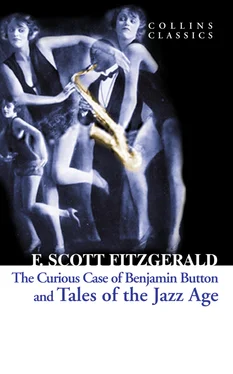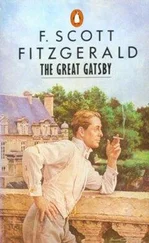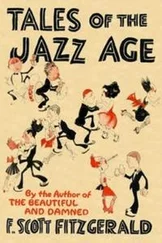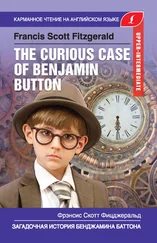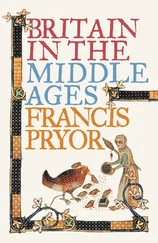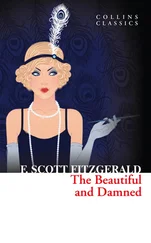1 ...7 8 9 11 12 13 ...19 Having rung off, or rather having been rung off on, Perry sat down on a three-legged stool to think it over. He named over to himself those friends on whom he might call, and then his mind paused as Betty Medill’s name hazily and sorrowfully occurred to him. He had a sentimental thought. He would ask her. Their love affair was over, but she could not refuse this last request. Surely it was not much to ask—to help him keep up his end of social obligation for one short night. And if she insisted, she could be the front part of the camel and he would go as the back. His magnanimity pleased him. His mind even turned to rosy-colored dreams of a tender reconciliation inside the camel—there hidden away from all the world …
“Now you’d better decide right off.”
The bourgeois voice of Mrs. Nolak broke in upon his mellow fancies and roused him to action. He went to the phone and called up the Medill house. Miss Betty was out; had gone out to dinner.
Then, when all seemed lost, the camel’s back wandered curiously into the store. He was a dilapidated individual with a cold in his head and a general trend about him of downwardness. His cap was pulled down low on his head, and his chin was pulled down low on his chest, his coat hung down to his shoes, he looked run-down, down at the heels, and—Salvation Army to the contrary—down and out. He said that he was the taxicab-driver that the gentleman had hired at the Clarendon Hotel. He had been instructed to wait outside, but he had waited some time, and a suspicion had grown upon him that the gentleman had gone out the back way with purpose to defraud him—gentlemen sometimes did—so he had come in. He sank down onto the three-legged stool.
“Wanta go to a party?” demanded Perry sternly.
“I gotta work,” answered the taxi-driver lugubriously. “I gotta keep my job.”
“It’s a very good party.”
“’S a very good job.”
“Come on!” urged Perry. “Be a good fella. See—it’s pretty!” He held the camel up and the taxi-driver looked at it cynically.
“Huh!”
Perry searched feverishly among the folds of the cloth.
“See!” he cried enthusiastically, holding up a selection of folds. “This is your part. You don’t even have to talk. All you have to do is to walk—and sit down occasionally. You do all the sitting down. Think of it. I’m on my feet all the time and you can sit down some of the time. The only time I can sit down is when we’re lying down, and you can sit down when—oh, any time. See?”
“What’s ‘at thing?” demanded the individual dubiously. “A shroud?”
“Not at all,” said Perry indignantly. “It’s a camel.”
“Huh?”
Then Perry mentioned a sum of money, and the conversation left the land of grunts and assumed a practical tinge. Perry and the taxi-driver tried on the camel in front of the mirror.
“You can’t see it,” explained Perry, peering anxiously out through the eyeholes, “but honestly, ole man, you look sim’ly great! Honestly!”
A grunt from the hump acknowledged this somewhat dubious compliment.
“Honestly, you look great!” repeated Perry enthusiastically. “Move round a little.”
The hind legs moved forward, giving the effect of a huge cat-camel hunching his back preparatory to a spring.
“No; move sideways.”
The camel’s hips went neatly out of joint; a hula dancer would have writhed in envy.
“Good, isn’t it?” demanded Perry, turning to Mrs. Nolak for approval.
“It looks lovely,” agreed Mrs. Nolak.
“We’ll take it,” said Perry.
The bundle was stowed under Perry’s arm and they left the shop.
“Go to the party!” he commanded as he took his seat in the back.
“What party?”
“Fanzy-dress party.”
“Where’bouts is it?”
This presented a new problem. Perry tried to remember, but the names of all those who had given parties during the holidays danced confusedly before his eyes. He could ask Mrs. Nolak, but on looking out the window he saw that the shop was dark. Mrs. Nolak had already faded out, a little black smudge far down the snowy street.
“Drive uptown,” directed Perry with fine confidence. “If you see a party, stop. Otherwise I’ll tell you when we get there.”
He fell into a hazy daydream and his thoughts wandered again to Betty—he imagined vaguely that they had had a disagreement because she refused to go to the party as the back part of the camel. He was just slipping off into a chilly doze when he was wakened by the taxi-driver opening the door and shaking him by the arm.
“Here we are, maybe.”
Perry looked out sleepily. A striped awning led from the curb up to a spreading gray stone house, from which issued the low drummy whine of expensive jazz. He recognized the Howard Tate house.
“Sure,” he said emphatically; “’at’s it! Tate’s party to-night. Sure, everybody’s goin’.”
“Say,” said the individual anxiously after another look at the awning, “you sure these people ain’t gonna romp on me for comin’ here?”
Perry drew himself up with dignity.
“’F anybody says anything to you, just tell ’em you’re part of my costume.”
The visualization of himself as a thing rather than a person seemed to reassure the individual.
“All right,” he said reluctantly.
Perry stepped out under the shelter of the awning and began unrolling the camel.
“Let’s go,” he commanded.
Several minutes later a melancholy, hungry-looking camel, emitting clouds of smoke from his mouth and from the tip of his noble hump, might have been seen crossing the threshold of the Howard Tate residence, passing a startled footman without so much as a snort, and heading directly for the main stairs that led up to the ballroom. The beast walked with a peculiar gait which varied between an uncertain lockstep and a stampede—but can best be described by the word “halting.” The camel had a halting gait—and as he walked he alternately elongated and contracted like a gigantic concertina.
III
The Howard Tates are, as every one who lives in Toledo knows, the most formidable people in town. Mrs. Howard Tate was a Chicago Todd before she became a Toledo Tate, and the family generally affect that conscious simplicity which has begun to be the earmark of American aristocracy. The Tates have reached the stage where they talk about pigs and farms and look at you icy-eyed if you are not amused. They have begun to prefer retainers rather than friends as dinner guests, spend a lot of money in a quiet way, and, having lost all sense of competition, are in process of growing quite dull.
The dance this evening was for little Millicent Tate, and though all ages were represented, the dancers were mostly from school and college—the younger married crowd was at the Townsends’ circus ball up at the Tallyho Club. Mrs. Tate was standing just inside the ballroom, following Millicent round with her eyes, and beaming whenever she caught her eye. Beside her were two middle-aged sycophants, who were saying what a perfectly exquisite child Millicent was. It was at this moment that Mrs. Tate was grasped firmly by the skirt and her youngest daughter, Emily, aged eleven, hurled herself with an “Oof!” into her mother’s arms.
“Why, Emily, what’s the trouble?”
“Mamma,” said Emily, wild-eyed but voluble, “there’s something out on the stairs.”
“What?”
“There’s a thing out on the stairs, mamma. I think it’s a big dog, mamma, but it doesn’t look like a dog.”
“What do you mean, Emily?”
The sycophants waved their heads sympathetically.
“Mamma, it looks like a—like a camel.”
Mrs. Tate laughed.
“You saw a mean old shadow, dear, that’s all.”
Читать дальше
